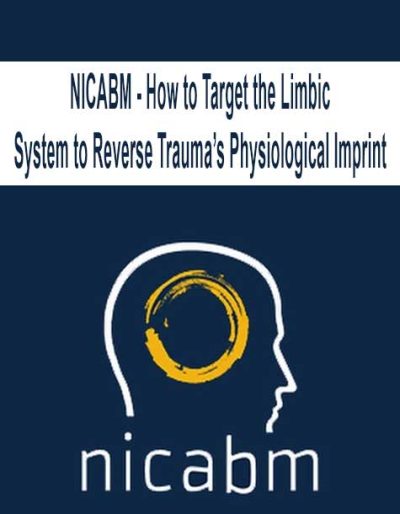NICABM – How to Target the Limbic System to Reverse Trauma’s Physiological Imprint | Instant Download !
$67.00
- Description
Description
NICABM – How to Target the Limbic System to Reverse Trauma’s Physiological Imprint | Instant Download !
PLEASE CHECK ALL CONTENTS HERE:
Salepage : NICABM – How to Target the Limbic System to Reverse Trauma’s Physiological Imprint
Archive: https://archive.fo/NADUS
How to Work with the Limbic System to Reverse the Physiological Imprint of Trauma
Once someone has experienced trauma, they’re often on guard, almost perpetually afraid that it will happen again. And here’s the thing . . .
. . . it’s not only the brain that learns this lesson. The body and nervous system do, too.
So to help patients change the way their body reacts after trauma, we need interventions designed to override the lessons the body and nervous system learned during trauma.
That’s why we created a course with four of the world’s top experts – they’ll share their most practical, effective strategies for helping patients resolve trauma that’s held in the brain and body.
How to Target the Limbic System to Reverse Trauma’s Physiological Imprint

What’s Happening in the Body During Trauma
Pat Ogden, PhD Bessel van der Kolk, MD
- How to Help Clients Begin to Notice What’s Going On In Their Body
- One Common Coping Mechanism for Childhood Trauma
- How to Help Traumatized Clients Become More Comfortable Focusing Inward
- Working with the Story the Client’s Body Is Telling

Working with a Client’s Trauma Story
Bessel van der Kolk, MD Pat Ogden, PhD Peter Levine, PhD
- How to Tell When Talk Therapy Could Be Keeping Your Client Stuck in Trauma
- What to Do When a Client’s Somatic Narrative and Verbal Narrative Don’t Match Up
- How to Read a Client’s Trauma Story Through Their Posture

Getting a Reading on a Traumatized Nervous System
Pat Ogden, PhD
- Four Ways to Track How Trauma Is Impacting a Client’s Nervous System
- Working with a Client Who Is Prone to Self-Harm – A Case Study

How to Use Movement to Help a Client’s Body “Unlearn” Its Adaptation to Trauma
Bessel van der Kolk, MD Pat Ogden, PhD
- What to Look for in a Traumatized Client’s “Movement Vocabulary”
- Why Movement Is Critical for Clients Healing from Trauma
- Specific Types of Movement That Can Be Most Useful for Clients Who’ve Experienced Trauma

How to Target the Limbic System to Reverse Trauma’s Impact on the Body
Bessel van der Kolk, MD Ruth Lanius, MD, PhD
- Strategies to Change the Way a Person with a Trauma History Is Wired to Respond
- How to Reconnect the Upper and Lower Parts of the Brain After Trauma
- Limbic System Therapy in Clinical Practice – A Case Study

Critical Insights into Working with Trauma Through the Limbic System
Ruth Lanius, MD, PhD Ron Siegel, PsyD Ruth Buczynski, PhD
- One Element That’s Critical for Healing in the Treatment of Trauma
- Why Catharsis Usually Isn’t Helpful for Resolving and Integrating Feelings After Trauma
- Two Key Strategies to Help Clients Override Their Body’s Response to Trauma

Strategic Practices to Target the Limbic System in the Treatment of Trauma
Joan Borysenko, PhD Bill O’Hanlon, LMFT Ruth Buczynski, PhD
- How to Activate the Thinking Brain While Working with the Body
- One Way to Break the Repetitive Loop of Trauma
- Two Techniques to Help Clients Release Tension in the Body After Trauma
Here’s What You’ll Get:
Everything is yours to keep forever in your professional library
| Downloadable videos so you can watch at your convenience, on any device | |
| Audio recordings you can download and listen to at home, in the car, at the gym or wherever you like | |
| TalkBack Segments to distill key ideas (this is where we “land” the session) | |
| Next Week in Your Practice sessions to give you concrete strategies to use with patients | |
| Professionally-formatted transcripts of the sessions, to make review and action simple | |
| Three downloadable bonus videos to help you work more effectively with trauma |
Related Products
-
-95%
 Add to cartQuick View
Add to cartQuick View -
-94%
 Add to cartQuick View
Add to cartQuick View -
-96%
 Add to cartQuick View
Add to cartQuick View





